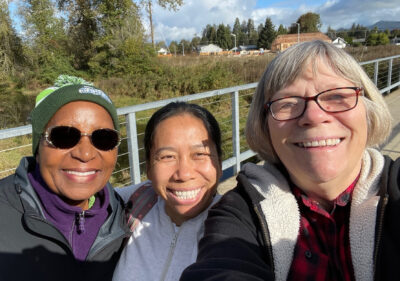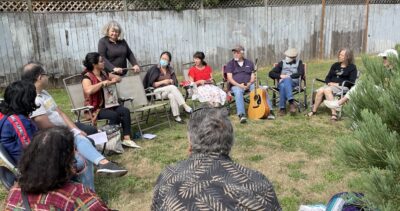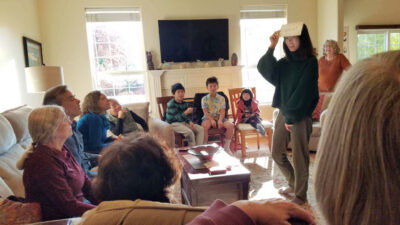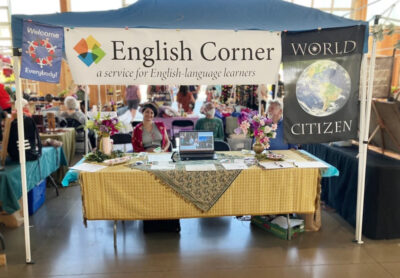Opportunity for English-language learners
by Marcia Veach, Springfield, Oregon
English Corner is free and open to anyone in Lane County who wants to attend the monthly in-person meetings. New volunteers and participants of all ages are always welcome. Find out more at Lane County English Corner.

Three friends who met through English Corner take a walk in Springfield, Oregon.
Practice English! Make Friends! That’s the slogan a group of Bahá’is in the Lane County, Oregon, cluster came with up for their English Corner service project, launched in the spring of 2021.
The idea for English Corner likely originated in China, but it has become a way for native and non-native English speakers worldwide to come together, all in aid of practicing having conversations in English. For the Lane County Bahá’ís who started this project—many of whom were returned Bahá’í pioneers—it would be a way to reach out to welcome people from around the world who are living, working or studying in our communities.
The Lane County group based their service project around the program initiated by the Colibri Learning Foundation, a Bahá’í-inspired educational endeavor in Vancouver, Canada. According to their website, “English Corner allows newcomers to practice communicating in English, make new friends, and together find opportunities to contribute to the wellbeing of the community.”
“At the heart of every development endeavour is consistent, systematic action. Action, however, needs to be accompanied by constant reflection to ensure that it continues to serve the aims of the endeavour.” – Office of Social and Economic Development, Bahá’í World Centre*
Finding the need and filling it is a process
Because of the COVID-19 pandemic, the Lane County English Corner started as a weekly Zoom meeting using the Colibri topic sheets, with their permission. The first attendees were Chinese graduate students from the University of Oregon. Occasionally, people of other language backgrounds would join in, but the group never grew substantially, despite ongoing outreach efforts at the University, Lane Community College, cultural festivals and any number of local restaurants. Eventually, the regular attendees to these online gatherings moved back home to China, and all the efforts to find local people to attend seemed to be stymied.
Though occasionally discouraged, the team reflected, consulted and chose to maintain that weekly online meeting in hopes that it could eventually blossom into a more widely used service.

English Corner participants meet in a backyard.
“Two of these Chinese participants thanked us profusely for the service,” said Kathryn Luckey, a team member. “They felt so grateful to be able to meet each week and talk about important topics in English. English is important to both of them in their positions in China.”
The time finally arrived in summer 2022 when the team could consider in-person gatherings. “We didn’t have enough people locally to justify weekly English Corner conversation practice gatherings, so we considered other ways to reach the same goal of connecting with immigrants or foreign-born residents in our area who don’t speak English as their native language,” said team member Lisle “Wei” Veach. “We wanted to create an activity that would also help build trusting bonds between local Bahá’ís and these new friends.”
A social gathering is added
That led to an English Corner Social gathering, beginning with a picnic in a local park in September of 2022. Several Bahá’ís who knew people from other countries invited those friends to that first picnic and many came. The program began with an explanation of English Corner, followed by a sing-along song in English. People were then asked to share something about their own culture, and the afternoon ended with socializing and refreshments. It was a joyful event and many people expressed interest in attending again. The guests were asked to share a convenient day and time for them to attend, and the team then committed to hosting at that time once per month.
During the winter months, the English Corner Social moved to the home of team members John and Kathryn Luckey. Xiaoying, a young Chinese mother especially loved these gatherings in a home: “I’ve lived in America for several years, and this is the first time I’ve ever been invited into the home of an American.” Her son is now participating in a Junior Youth Spiritual Empowerment program.

English Corner participants play a boisterous game to guess the word on the card.
The Social continues to follow a program of singing together, followed either by an English-language game or a question that each person can answer; for example, about their family or their favorite dish from their home country. English Corner Socials have drawn up to 20 people, including team members, and have had representatives from up to seven different countries. The informal chats at every Social have provided many opportunities for building bonds of friendship, and, in some cases, for individual Bahá’ís to share the Faith personally.
For example:
- One Chinese woman who was among the first to attend an English Corner is now part of a weekly devotional where she helps native English speakers learn to say Bahá’í prayers in Chinese.
- One young Chinese university student came to one English Corner. From there, she was invited to a Bahá’í youth-led musical devotional and is now engaged in studying the Ruhi materials.
- A Japanese woman planned a trip to Japan; when her ride to the Portland airport fell through at the last minute, she called an English Corner team member, who found a ride for her.
- When a young Asian couple who attended English Corner got engaged, the Social became a party in their honor.
- A woman from Ghana in West Africa said she learned more English participating in these casual conversations than her husband did taking a class.
- An Iranian woman, who learned of the English Corner through Bahá’í friends, attended regularly and began to go to holy day gatherings. She had to return to Iran to care for family, but English Corner was what she would miss most: “This is more than just way to practice English. It means a lot to be able to really talk to people and to make friends.”
“A line of action is conceived as a sequence of activities, each of which builds on the previous one and prepares the way for the next. Endeavours often begin with a single line of action, but gradually a number of interrelated lines emerge, constituting a whole area of action.” – Office of Social and Economic Development, Bahá’í World Centre*
The team continues to alternate between hosting the monthly English Corner Social in parks and at the Luckey family home; the number of guests still varies widely, so efforts to introduce more people to this service—and build friendships with people from around the world—are ongoing.
- Connections with local friends in the Chinese community keeps the team in the loop for their events. This led to tabling at an annual Asian night market in May and plans to do the same for the annual Asian Celebration in July.
- Engagement with the Catholic Community Services’ Refugee Resettlement Coalition of Lane County led to an article in their recent newsletter about the English Corner.
- Programs through the University of Oregon to connect international students with the community offer opportunities to meet new friends.
- A person at the Chinese Immersion School in Eugene invited the English Corner project to present at a PTO meeting this fall.

English Corner volunteers hosted a table at Oregon Asian Celebration, in an effort to make more friends.
Weekly meetings help the planning team reflect and evolve
The weekly Zoom meeting continues to anchor the project and team members who take turns hosting that conversation practice always come away feeling like they’ve once again renewed a friendship. The team plans to change the day of that meeting, making it more accessible to English as a Second Language students at the community college.
“Focused, systematic thinking and persistent, meticulous labour do not, of course, detract from the spirit of service that animates social action. While paying attention to the smallest practical details, one can be occupied with the most profound spiritual matters. A distinguishing feature of any Bahá’í endeavour has to be the emphasis it places on the spirit with which action is undertaken. This requires from the participants purity of motive, rectitude of conduct, humility, selflessness, and respect for human dignity.” – Office of Social and Economic Development, Bahá’í World Centre*
“English Corner made me realize that these casual, fun and engaging activities can really help folks in picking up native English,” reported Kathryn Luckey. “And it’s been a wonderful way for us to make new friends, too.”
To participate in English Corner:
- Visit the Lane County English Corner website at lisleveach.wixsite.com/lc-english-corner.
- Ask questions or register online at docs.google.com/forms/d/e/1FAIpQLSfW4zYeX-otg8Yh0ZXHZrPrG-9hXJ_EFfWBX9FETRnhT2Fgcw/viewform.
***
